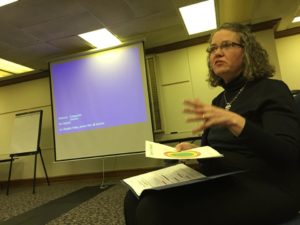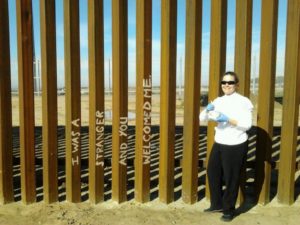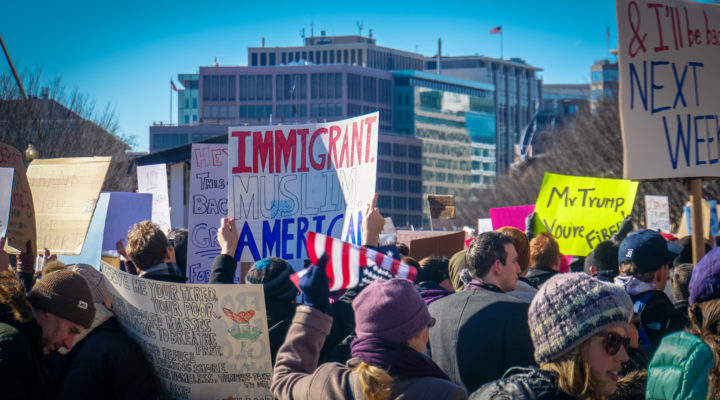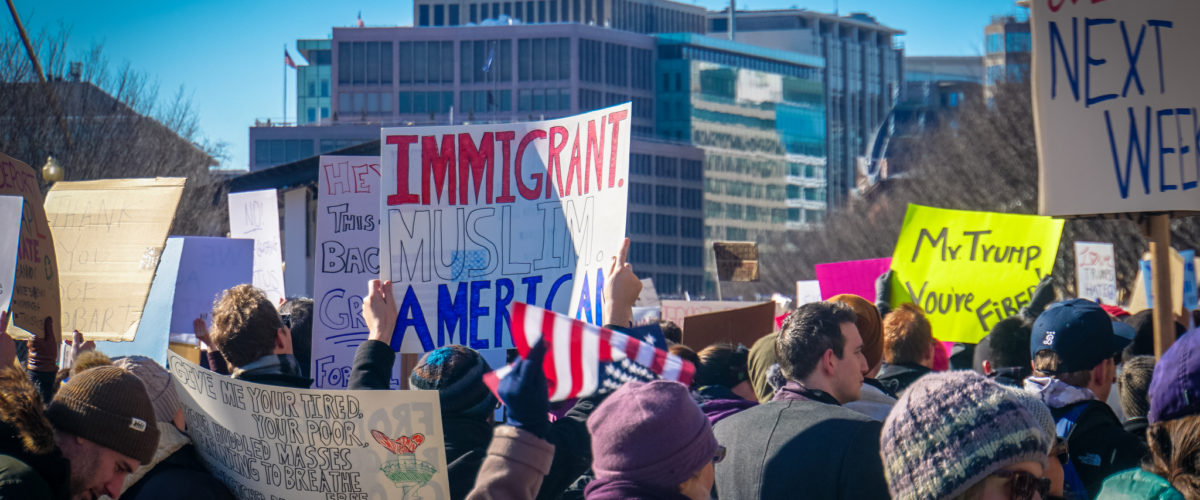The Baptist Peace Fellowship of North America has grown a lot since its founding in 1984.
Its focus over the years has expanded from poverty and nuclear proliferation to racial justice, gun violence and immigration, among other issues. And a more recent expansion of peacemaking efforts into Latin America led to an expansion of its name to BPFNA~Bautistas por la Paz (Baptists for Peace, in Spanish).
The fellowship’s bold embrace of Hispanics on both sides of the border has come under the leadership of LeDayne McLeese Polaski, who became executive director in 2015.

“None of this would have happened if it wasn’t for LeDayne because nobody in their right mind would have taken it on – and she did,” said George Williamson, founding BPFNA board president.
Polaski’s contributions have come into sharper focus in 2018, partly because July marked her 20th anniversary with BPFNA, and partly because she recently announced her intention to step down next May.
All indications are her last year with the organization will be one of the busiest, Williamson said.
BPFNA is moving headlong into intentional relationships and partnerships with Hispanics in the U.S. and Latin America and connecting member churches seeking to bring justice and compassion to immigrants and others suffering injustice.
Polaski’s vision and hard work throughout the process have been nothing short of monumental, Williamson said.
“It was heroic. It brought us to a point of major refocus.”
‘Sort of a no-brainer’
But just like BPFNA’s evolution, Polaski’s calling to peace work didn’t materialize overnight though, she said, there were early signs.
As a youth, she spent summers at a United Methodist service camp in her native South Carolina, where participants performed home repairs by day and engaged in theological reflection at night.
“We were looking at what we were doing, and we were looking at God and poverty and seeing how they might relate,” she said.
For Polaski, who had been raised Baptist earlier in childhood, those summer experiences were important in shaping her eventual calling.
“It was the first time somebody said to me, ‘I hear you have this passion for this work – have you considered being a pastor?’ My response was something along the lines of ‘girls can do that?’”
Graduating high school in 1985, Polaski attended Furman University. It was there, in an introduction to the New Testament class taught by John Shelley, that she took another step toward her eventual calling.

Polaski at a section of a wall on the southern border.
“I thought I had already been introduced to the New Testament,” she said. “He was the first person I heard talk about scripture from a perspective of justice.”
More steps occurred when she started worshiping at Watts Street Baptist Church in Durham, North Carolina, during her studies at Duke Divinity School.
“I only had the vaguest idea of why I was in seminary,” she said.
But the church, pastored then by Mel Williams, further modeled for her what it means to be compassionate and caring in ministry.
Another piece of the puzzle fell into place during Polaski’s final semester of seminary, when she was called as minister of youth at Myers Park Baptist Church in Charlotte, North Carolina.
The congregation “has such a huge and long-term commitment to justice.” That commitment rubbed off on her.
Looking back now, Polaski can see how each of those moments, from the summer service camps to Myers Park and every one in between, positioned her for a ministry that combined justice work with her proven organizational skills.
“So when the job opening came with the Baptist Peace Fellowship, it made sense to me,” she said. “This is a group that has the same commitments I do and has the same interests I do. It was sort of a no-brainer.”
‘It was a huge relief’
Ken Sehested, the founding director of BPFNA, said the hire was a no-brainer for him, as well.
Polaski joined the organization to assume organizational and administrative tasks, leaving Sehested free to focus on vision and mission.
Her calling and passion for peace and reconciliation work together with her administrative prowess made Polaski ideal for the job, he said.
“It was a huge relief to have her because it gave me a chance to focus less on the details, so that was a boon to me,” said Sehested, a Baptist minister and the editor of Prayer&Politiks, an online journal concerned with the intersection of spiritual formation and prophetic action.
But the new hire did much more than enable him to focus on leadership tasks. Polaski also brought event-planning and networking skills to bear that helped grow the fellowship’s relationships and relevance, he said.
“LeDayne’s presence strengthened the organization.”
‘Very dramatic changes’
Polaski’s arrival came just as the organization was beginning a process of expanding the scope of its work.
BPFNA was launched by Baptists during the Reagan era. One of the initial concerns was the impact nuclear proliferation and rising defense budgets were having on the poor. U.S. involvement in the war in Nicaragua was another major concern.
In that period there wasn’t much change in the ranks of those involved, said Williamson. “The first 10 years were very exciting and transforming, but it never occurred to us to think about bringing in new people.”
Sehested and the board demonstrated “a lot of sophisticated and empathic leadership” to recognize that and begin moving to a more open posture.
Polaski’s presence enabled the fellowship to pivot.
“We went through some very dramatic changes and she had a lot to do with that,” Williamson said. “That’s when we matured as an organization.”
‘We will be pushed to do more and more’
While the Reagan era and the USSR are gone, some of core challenges remain for the BPFNA, Polaski said: “It continues today with Trump’s budgets. There are cuts to social services while adding to the military.”
But gun and police violence, white supremacy, immigration, LGBTQ rights and the environment also are pressing today, she added.
However, with just two full-time staffers, BPFNA cannot take on those issues alone. Instead, it functions as a resource for individuals, churches and other ministries called to engage in those areas of ministry.
It’s also there for those who don’t know what to do.
“They see these really big issues, like poverty, racism or gun violence, and just feel overwhelmed,” she said. “A lot of them ask, what can we do?”
The fellowship provides connections and direction on how to engage those issues. It also publishes stories highlighting the work others do on a given issue. That both inspires the ones already active and those who want to be, Polaski said.
“Part of what we do is help people see that whatever you are called to do relates to this much bigger picture.”
Part of that bigger picture includes the fellowship’s growing commitment to engage in peace-making work south of the U.S. border.
It held its annual summer conference in Mexico in 2017 and the 2019 event will be held in Colombia. Relationships already are growing and creating opportunities to work with immigrants, Polaski said.
“We knew that if we approved this, if we did this, we are going to have to change. We know we will have to live into this and that we will be pushed to do more and more.”


